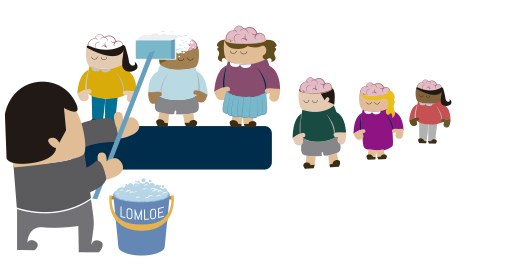- Text Begoña Ladrón de Guevara. President of COFAPA
What is happening in our country so that, in the midst of a pandemic, a global health problem whose main victims are families, we are talking about an educational reform that was proposed 2 years ago and that does not provide an answer to the situation we have been experiencing for a few months.
What is happening so that an Education Law, the most important law for the future of a country, is being drafted without consensus, without debate, without dialogue with civil society or with the agents involved, without even a debate in the Congress, since the amendments and compromises have been voted at full speed.
If they had listened to us, they would know that we defend the public and private subsidized networks and that we want them to be of high quality. We believe in a plural Education, where no one is excluded and where families can exercise their rights regardless of their economic resources. We believe in an Education System that leaves no one out.
Coexistence of educational models
The basis of the different educational models begins precisely in the fact that the Constitution guarantees freedom of education, both to those who offer a certain organizational model and to those who want to choose it. The plurality of these models brings richness to the System, but only if we know how to recognize an intrinsic value in the other.
Sometimes, under the cloak of a misunderstood equality, there is a desire to impose egalitarianism; and under the cloak of a supposed equity, there are those who try to develop a single way of thinking.
The Constitution protects the Right to Freedom of Education; governments establish the standards, curricula and objectives; schools offer projects that are in line with them and families must be able to freely choose the project they want for their daughters and sons. And this is how this principle of first educators is really exercised: when parents can choose the school they want for their children.
This freedom of choice, which unfortunately is so much in question at the moment, responds to the great concern that we parents have of wanting the best for our children... We are risking a lot because setting limits to plurality has direct repercussions on the future of our children, on the future of society.
Families, the first educators
Parents find it difficult to understand policies that give priority to other interests, and that do not respect the will of families in this matter, who are the ones who know our children best and who need schools -public or private- that we can call our own, because we have chosen them freely, because they work along the same lines as we do and we can, therefore, place ourselves in the same direction as they do.
Giving priority to parents' criteria makes so much common sense that it is difficult to understand a contrary pattern of action, such as the so-called "policies" that are distancing politicians and politics itself from the concerns, worries and affection of citizens.
Families need more than ever to trust us, we need not to be judged, we need not to be excluded from the educational process of our own children, as it seems they want to do now, assigning the public place that the State considers best for them.
That is why we parents will not give up and will continue to fight for social plurality in our educational system.












